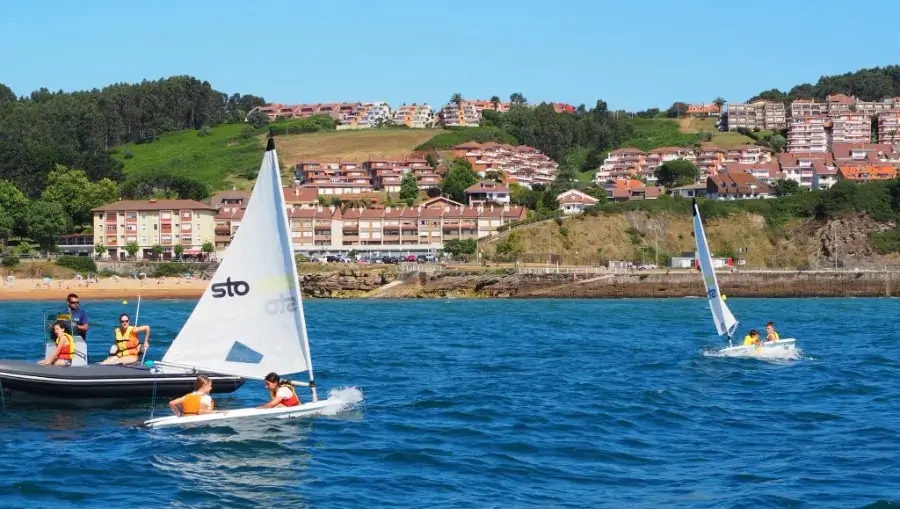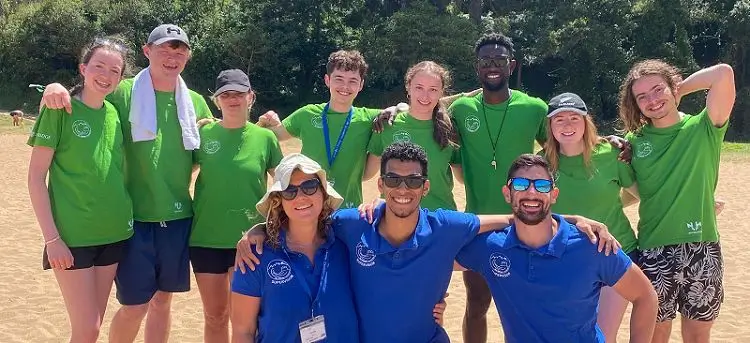When summer arrives and parents look for options to improve their children's English, two alternatives usually come to mind first: an intensive summer course or an English camp. At first glance, both seem to have the same goal, but the experience and the results they offer are very different.
An intensive course largely reproduces the dynamics of a traditional classroom: hours of lessons, written exercises, and exam preparation. In contrast, an English camp turns the language into the center of social life, sports, creativity, and everyday communication. Instead of learning theory, kids learn to live in English, especially in an international English immersion summer camp in Spain.
The key is to understand what each child needs: if the goal is memorizing rules, an intensive course may be enough; but if what we want is real fluency, confidence, and motivation, the camp is the most effective option.
In this article, we will explore the differences between both options and why an immersion camp is the most complete alternative for children and teenagers to make the most out of their summer.
What an intensive summer English course offers
Intensive English courses in summer are usually designed as an extension of school or traditional language academies. Their main objective is to reinforce theoretical knowledge over a short period of time, usually with several hours of daily classes focused on grammar, vocabulary, and written exercises.
Benefits of an intensive course
- Reinforces the academic content of the school year.
- Can help prepare for official English exams.
- Offers a clear and organized structure.
Limitations of an intensive course
- Takes place in a classroom, which reduces motivation for many children in summer.
- Oral practice is limited and often restricted to directed exercises.
- Does not promote social interaction or natural communication in English.
- It may feel like “more homework” instead of a fun experience.
In short, intensive courses are useful for reinforcing the theoretical part of the language, but they struggle to help children gain fluency and confidence when speaking. Learning remains in their heads, but does not move into real life.
What an immersive English camp offers
An English camp does not feel like a classroom, but like a small community where the language becomes a tool for communication every single moment. That is why many families opt for an international English immersion summer camp in Spain, where children don’t just study English, but live it naturally throughout the day.
Benefits of an immersion camp
- Learning in real-life contexts: the language is practiced in everyday situations, strengthening memory and fluency.
- Fun as the engine of learning: by associating English with activities they love, children learn without feeling like they are “studying”.
- Multicultural interaction: sharing the experience with peers of different nationalities motivates them to use English as the common language.
- Personal development: beyond the language, they gain autonomy, confidence, and social skills.
An unforgettable summer
Unlike an intensive course, which focuses on academic reinforcement, an English camp transforms learning into a life experience. Children return home not only with a better level of English, but also with new friendships, unforgettable memories, and greater self-confidence.
Direct comparison between intensive course and camp
Although both intensive courses and English camps have the same objective — improving language level — the way they achieve it is very different.
Here is a comparison of the two approaches:
|
Aspect |
Intensive English course |
Immersive English camp |
|
Environment |
Traditional classroom |
Nature, sports, social interaction |
|
Motivation |
May feel like “homework” |
Fun and excitement drive learning |
|
Speaking practice |
Limited and guided |
Constant and spontaneous in daily activities |
|
Exposure time |
2–4 hours of class per day |
+15 hours/day in English (≈200 hours in 15 days) |
|
Social connections |
Limited to the classroom |
International friendships and multicultural interaction |
|
Personal development |
Academic |
Confidence, autonomy, social skills |
At the Village, this difference is even clearer. While an intensive course may offer between 20 and 40 hours of classes in a month, here children experience more than 200 hours of English in just 15 days. All of this in an international environment with 80% international coaches and a ratio of 1 counselor for every 5 children, ensuring real learning, fun, and close support.
Emotional and social benefits of camp vs. intensive courses
An intensive course can reinforce academic knowledge, but it hardly contributes to personal growth. In contrast, an English camp becomes a space where children not only learn a language, but also develop life skills.
Confidence and self-esteem
At camp, children discover they are capable of communicating in English in real situations. Every achievement — from joining an activity to making new friends — strengthens their personal confidence.
Friendships and multicultural living
While interaction in an intensive course is limited to the classroom, in a camp children share everything: sports, outings, workshops, and leisure moments. This creates deep friendships, enriched by the opportunity to live alongside peers from other nationalities.
Autonomy and responsibility
Being away from home boosts independence and teaches them to manage routines, schedules, and belongings — something a classroom course can rarely provide.
At the Village, these benefits are enhanced thanks to age-adjusted programs (Kids and Teens), sports and creative activities designed to foster collaboration, and a safe environment with 24-hour supervision. Thus, the camp not only improves English, but also transforms the way children relate to the world.
the Village as an alternative to traditional intensive courses
If the goal of an intensive course is to reinforce knowledge, the goal of an immersive English camp is to transform the way children learn and live the language. And that’s where the Village becomes the best alternative.
With over 200 hours of English in 15 days, 80% international coaches, and coexistence with young people from 12 nationalities, the camp recreates an international experience without leaving Spain. Unlike an intensive course, where English is limited to the classroom, here children use it every moment of the day: in sports, creative workshops, excursions, and social activities.
Premium facilities — 4★ hotel and a 52,000 m² sports campus —, a 1:5 counselor-to-camper ratio and 24-hour medical supervision give parents the peace of mind of knowing their children are cared for at all times.
At the Village, children not only reinforce English: they turn it into a natural part of their lives, while developing confidence, autonomy, and international friendships.
An intensive course can teach English. An immersion camp teaches much more: to believe in yourself, to live with other cultures, to learn through play, and to discover that language is a tool to connect with the world.
The difference is not in the amount of theory reviewed, but in the intensity of the experiences kids live. And those experiences are the ones that remain in memory, feed motivation, and make English feel natural.
At the Village, every summer becomes a unique opportunity to truly learn English, make international friends, and return home with renewed confidence. Because in the end, what transforms children is not the hours of class, but the memories that stay with them for life.




